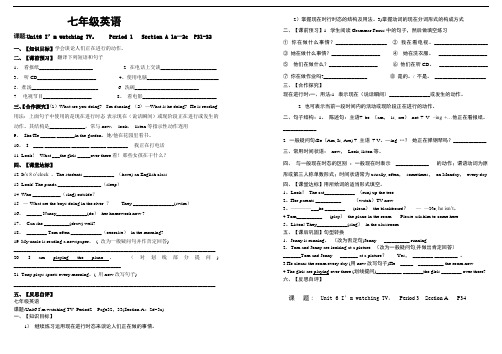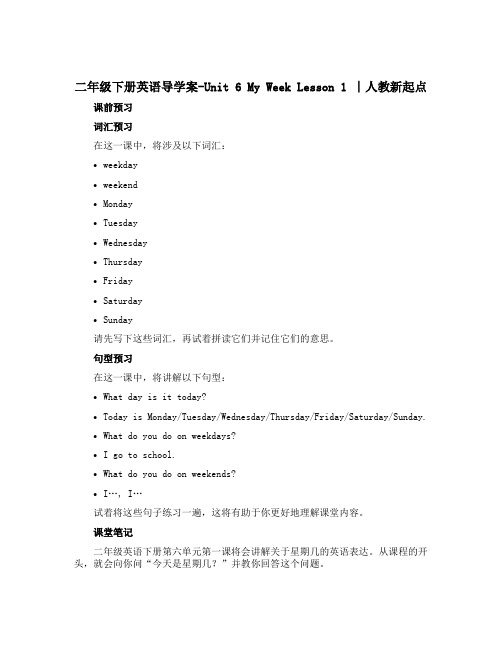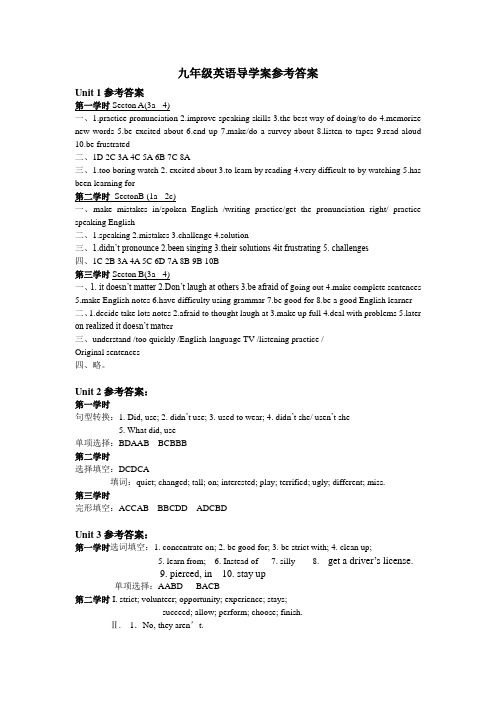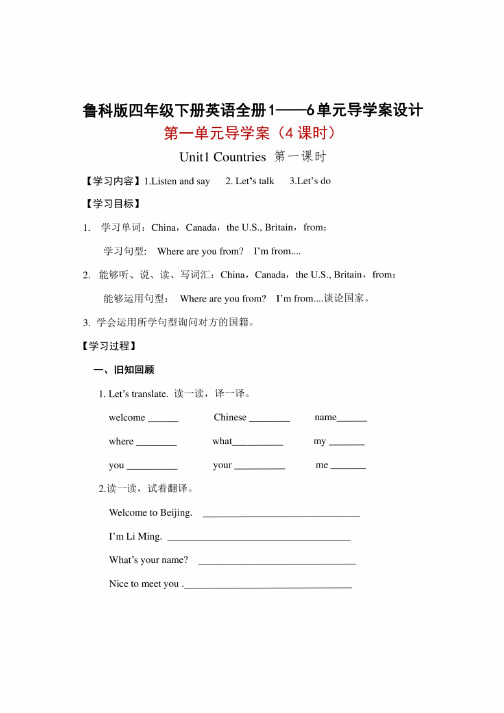导学案1 Unit 6 I
Unit6I27mgoingtostudycomputerscience.导学案

Houwei Middle School Jiangchuan County【课题】 Unit 6 I’m going to study computer science. 第一课时(Section A1a—2c)学科:英语教师:刘艳班级:八年级(2)、(6)班教学时间: 2014年秋季学期第 8 周【课标要求】学习运用一般将来时【学习目标】掌握以下知识点1.记忆本课7个单词及2个短语2.熟练运用句型-What are you going to be……?-I'm going to be ……谈论将来意向,运用句型-Howare you going……?--I'm going to …….谈论实现方式。
【学习重点】. 动词一般将来时及时间状语从句的使用【前测】自学与小组讨论1+1自主学习通过自学能写出下列有关职业名词:程序师___________工程师____________飞行员_____________教师___________演员__________篮球运动员__________________电脑程序员___________钢琴家__________科学家__________驾驶员___________小提琴手__________计算机程序_____________________长大________________短语:学习计算机科学____________________________每天练习篮球__________________________努力学习数学_______________________________学习表演课程__________________________【课堂1+1】:小组讨论和小组展示1+1Task1. 探究学习学习谈论将来意向及实现方式1、记忆并练习下列对话:-What are you going to be when you grow up?-I'm going to be a basketball player.-How are you going to do that?-I'm going to practice basketball every day..表示计划、打算要做或即将发生的事,be(am, is, are)有人称和数的变化。
新版unit6-I'm-watching-TV-导学案

七年级英语课题:Unit6 I’m watching TV。
Period 1 Section A 1a—2c P31-32一、【知识目标】学会谈论人们正在进行的动作。
二、【课前预习】翻译下列短语和句子1。
看报纸_____________________ 2. 在电话上交谈______________________ 3。
听CD_______________________ 4。
使用电脑____________________________ 5.煮汤__________________________ 6. 洗碗_________________________7. 电视节目___________________ 8。
看电影_____________________________三、【合作探究】(1)-What are you doing? - I'm dancing.(2)—What is he doing? -He is reading. 用法:上面句子中使用的是现在进行时态.表示现在(说话瞬间)或现阶段正在进行或发生的动作。
其结构是______________,常与now,look,listen等指示性动作连用.9。
She/He ______ _______in the garden。
她/他在花园里看书。
10。
I ____ __________ _______ ______ ________. 我正在打电话.11. Look!What ___the girls _____over there.看!那些女孩在干什么?四、【课堂达标】12. It’s 8 o’clock 。
The students ____________ (have) an English class.13. Look! The panda _________________(sleep).14. Who ___________(sing) outside?15. -—-What are the boys doing in the river ?---They ________________(swim)16。
二年级下册英语导学案-Unit 6 My Week Lesson 1 ∣人教新起点

二年级下册英语导学案-Unit 6 My Week Lesson 1 ∣人教新起点课前预习词汇预习在这一课中,将涉及以下词汇:•weekday•weekend•Monday•Tuesday•Wednesday•Thursday•Friday•Saturday•Sunday请先写下这些词汇,再试着拼读它们并记住它们的意思。
句型预习在这一课中,将讲解以下句型:•What day is it today?•Today is Monday/Tuesday/Wednesday/Thursday/Friday/Saturday/Sunday.•What do you do on weekdays?•I go to school.•What do you do on weekends?•I…, I…试着将这些句子练习一遍,这将有助于你更好地理解课堂内容。
课堂笔记二年级英语下册第六单元第一课将会讲解关于星期几的英语表达。
从课程的开头,就会向你问“今天是星期几?”并教你回答这个问题。
This is an example of the question and answer you will learn in this lesson:•Q: What day is it today?•A: Today is Monday.We use this sentence structure to talk about what day it is.课堂练习请你回答以下问题:1.What day is it today?2.What is the sentence structure we use to talk about what day it is?接下来,我们将学习关于平日和周末的不同活动。
We will also learn about the different activities that we do on weekdays and on weekends.课堂练习请你回答以下问题:1.What do you do on weekdays?2.What do you do on weekends?回答这些问题时请使用以下语句:•On weekdays, I go to school.•On weekends, I…, I…生词请记住以下词汇:•Weekday•Weekend•Monday•Tuesday•Wednesday•Thursday•Friday•Saturday•Sunday课后作业1.跟着老师朗读本课课文。
辽宁省灯塔市第二初级中学七年级英语下册 Unit 6 I'm watching TV Period 1导学案(无答案)(新版)

Unit 6 I’m watching TV【学习目标】课标要求:主要围绕“What are you doing?”这一主题展开各种教学活动,并以这一主题引出现在进行时的一般疑问句,否定句以及特殊疑问句等语言功能。
1.人们正在做的事情1、语法:学习现在进行时4、w标语言:What are you / they doing? I'm / we’re/ They’re watching TV.Is he/ she watching TV? Yes, he/ she is. / N o, he/ she isn’t.2、词汇:clean, read, happy, apartment,目标达成:通过本单元的教学,我要求学生能通过上下文内在的逻辑联系或在观察别人的行为和活动时能用现在进行时来准确表达所发生或进行的动作。
学习过程:学习流程:【课前展示】复习反馈:(一)、翻译词组:1.做作业2.看电视 3吃早餐4.看海豚表演5.参观动物园6.谈论钱7.为杂志写故事 8.努力工作(学习)(二)、说出动词现在时第三人称单数的变化【创境激趣】1.教师出示几张图片, 叫一位学生按照老师图片上的提示做动作,引出现在进行时的结构和用法。
如:T: He/ She is singing now.They are playing football now.2. 接下来的任务型听力要求学生对动作作出反应,教师可承接刚开始的话题,引导学生根据所学语言完成任务:(通过听力训练,现在进行时的结构得以很好的落实)。
【自学导航】叫学生归纳出现在进行时的结构句型:主语 + am/ is / are+ 动词的现在分词要求每小组进行问答练习。
【合作探究】1叫一些学生背向着全班同学来做一些动作,让其他学生来猜他或她正在干什么。
进行小组比赛,猜对的同学以一颗红星加以鼓励,比一比哪组同学的红星最多。
直到猜对为止。
2单项选择。
( ) 1. ---Let's play the computer games.---_______.A: Yes, I do B: Thank you C: That sounds good D: No, we don't( ) 2. Thanks ____ your help. A: for B: at C: about D: to( ) 3. –Who’s in the room? ---Mr. Smith is. He____ a letter.A: is writing B: write C: writing D: writing( ) 4. ---____ do the boys watch TV? ---At home. A. when B: Where C: How D: What( ) 5. ---Can you buy a dictionary for me? ____.A: Sure B: You’re welcome C: Here you are D: Yes, I do( ) 6.What are you doing? We are ____.A readB readingC readingD reads【展示提升】(一)、用所给单词的适当形式填空1. What__________ the children ___________(do)? They are reading.2. What is Mike doing? He__________(run).3. What ——he ——(do)? He is taking. a taxi.4. What are they doing? They_______(clean) the classroom.5. Look! Dave and Mary __________(dance).6. She ___________(not do) her homework. She's reading.7. It's seven in the morning. Mr Black__________(have) breakfast.8. Lily likes __________very much. She __________very well. She can __________English songs.(sing)9..____My brother__________(take) a shower now?10. __________Bob __________(swim)now?【强化训练】一.根据汉语提示完成句子。
九年级英语导学案参考答案

九年级英语导学案参考答案Unit 1参考答案第一学时Secton A(3a-_4)一、1.practice pronunciation 2.improve speaking skills 3.the best way of doing/to do 4.memorize new words 5.be excited about 6.end up 7.make/do a survey about 8.listen to tapes 9.read aloud10.be frustrated二、1D 2C 3A 4C 5A 6B 7C 8A三、1.too boring watch 2. excited about 3.to learn by reading 4.very difficult to by watching 5.has been learning for第二学时SectonB (1a_-2c)一、make mistakes in/spoken English /writing practice/get the pronunciation right/ practice speaking English二、1.speaking 2.mistakes 3.challenge 4.solution三、1.didn’t pronounce 2.been singing 3.their solutions 4it frustrating 5. challenges四、1C 2B 3A 4A 5C 6D 7A 8B 9B 10B第三学时Secton B(3a-_4)一、1. it doesn’t matter 2.Don’t laugh at others 3.be afraid of g oing out 4.make complete sentences5.make English notes6.have difficulty using grammar7.be good for8.be a good English learner二、1.decide take lots notes 2.afraid to thought laugh at 3.make up full 4.deal with problems ter on realized it doesn’t mat ter三、understand /too quickly /English-language TV /listening practice /Original sentences四、略。
精编鲁科版四年级下册英语全册1——6单元导学案设计(24课时)

鲁科版四年级下册英语全册1——6单元导学案设计第一单元导学案(4课时)Unitl Countries第一课时【学习内容】1.Listen and say 2.Let's talk 3.Let's do【学习目标】1.学习单词:China,Canada,the U.S.,Britain,from;学习句型:Where are you from?Vm from....2.能够听、说、读、写词汇:China,Canada,the U.S.,Britain,from;能够运用句型:Where are you from?Vm from....谈论国家。
3.学会运用所学句型询问对方的国籍。
【学习过程】—、旧知回顾1.Let9s translate.读一读,译一译。
welcome Chinese namewhere what myyou_____________your_____________me_________2.读一读,试着翻译。
Welcome to Beijing._________________________________________Fm Li Ming.________________________________________________What's your name?_________________________________________Nice to meet you.____________________________________________二'预习导航1.阅读Listen and say,试选择合适答案。
(1)W elcome to.A.ChinaB.CanadaC.Britain(2)—Who is from the U.S.?一.A.JimB.MikeC.Mary2.选择对应的汉语意思。
⑴()Where are you from? A.认识你很高兴⑵])Nice to meet you. B.我叫玛丽。
人教版八年级上unit6_I'm_going_to_study_computer_science导学案

Unit 6 I’m going to study computer science.一、将来时态的句子谓语部分构成分两种,一是助动词+ 动词原形;二是be going to +be going to 所在的句子主要是表示计划、、要做某事。
eg: I’m going to take guitar lessons. 我要去上吉他课了。
(是事先计划和安排好了要去上课的)注意:①、”there be”句型的一般将来时结构是要将will或be going to 放在there 和be 之间:There will be…/ There is going to be。
例如:明天我们学校会有一次会议:There be a meeting in our school tomrrow. ②、一些表位置移动的动词常常用进行时形式表示将来,而不用be going to结构,这些动词是等。
【考例】Hurry up! The train (leave) in a minute.I’m (come). 我马上来。
二、a.when. 引导时间状语从句;一般表示与一件事同时发生另一个动作。
一般由两个句子构成,有when的句子是时间状语从句,另一句是主句。
eg: When Mrs Zhang came in.I was reading English \book.b.cook v.. /n cooker n.翻译:The cook is cooking.c. science n →scientist['saɪəntɪst] n【考例】①Why do you want to be a ________________(science)?( ) ②My brother likes math very much. He wants to be a ___ when he grows up.A. pianoB. driverC. pilotD. scientistd.program n. programmer n.e. engineer n 一位工程师(a/an)engineer【记】engine(发动机) →engineer( ) ①Her uncle is an ______ in big factory.A. starB. pilotC. engineer D . player( ) ②—______ are you going to be in the future?—I’m going to be _____.A. How; engineerB. What; engineerC. What; an engineerD. How; an engineerf.violin n 小提琴→violinist [vaɪə'lɪnɪst] n短语:Play 拉小提琴【拓展】-ist 是一个名词后缀,加在某些名词或动词后面,可用来表示“从事某种职业的人“G piano→pianist science→scientist art →artist 艺术家My cousin wants to be a _____________(violin) in the future.F Piano n 钢琴→pianist ['pɪənɪst] n 短语:play 弹钢琴三、【解析】grow →grew →grown v. 1) 生长,成长(2) 种植( )①When he ___ , he ___ to be a policeman.A. grow up ; wantB. grows up ; wantC. grows up ; wantsD. grow up ; wants ( )②The farmer likes _____ vegetables in his garden, and they all ____ well.A. growing; grow upB. to grow ; grow upC. growing; growD. to grow ; growsb. He’s going to 他打算去上表演课【词形变换】act v 表演→actor n 男演员→actress n 女演员【名言】Think carefully before you act . 三思而后行【短语】一个男演员;act as 充当,起作用take acting lessons 上表演课【注】take singing lessons 上声乐课take … lessons = have… lessons 上……课give sb. a lesson 给某人一个教训①Li Long loves art and wants to be an___________ (act) in the future②—Are they going to take ________________(act) lessons?—No, they aren’t .( ) ③If you are going to be an actor, you have to ________.A. take acting lessonsB. take act lessonsC. take acting lessonD. take act lessonc. I’m going to every day.我将会每天练习篮球。
Unit 6 I'm going to study computer science.导学案

Unit 6 I’m going to study computer science. 导学案第1课时(Section A 1a-3a)班级姓名学习目标:1.熟练运用句型谈论将来意向:-What do you want to be when you grow up?-I want to be ……运用句型谈论实现方式。
-How are you going to do that? --I'm going to …….预习案学习任务1:个人默读P41&P42的单词和短语,并进行记忆,然后关上书本,看音标或中文写出以下单词或短语:/ 'dɒktə(r) / ________ / 'draɪvə(r) /__________ / kʊk / _______/ 'paɪlət / __________ / ˈsaɪəntɪst /_________ / ˌendʒɪ'nɪə/ _____________/ˌvaɪəˈlɪnɪst /_________ / ˈpɪənɪst / __________ / ˈprəʊgræmə(r)/_______________编程人员__________________确保______________对…有把握________________ 学习任务2:写出你知道的表示职业的名词:(10个以上)_______________________________________________________________________ _______________________________________________________________________ 学习任务3:完成P 48 Self check 第一题(把职业和对应学科连线)& 完成课本P43 3a 学习任务4:阅读P41 1c的对话,然后根据你自己的实际情况回答问题:What do you want to be when you grow up?I want to be a / an _____________.How are you going to do that?I’m going to ____________________________________________.学习任务5:Read P42 2d carefully and answer the questions:1. What does Ken want to be? ___________________________________________________2. How is he going to do that? ___________________________________________________3. What does Andy want to be? ___________________________________________________4. What does Andy’s parents want her to be? ________________________________________学习任务6:为了实现不同的梦想,你们打算怎么做呢?请你们翻译以下词组:我打算…I’m going to①努力学习数学_______________________ ②每天训练篮球_________________________③上表演课___________________________ ④上烹饪学校__________________________⑤坚持写日记__________________________ ⑥每天训练弹钢琴_______________________探究案:课堂任务1:Brain strom :jobs课堂任务2:PairworkWhat do you want to be when you grow up? I want to be a / an….How are you going to do that? I’m going to….Report like this: Jim is going to be a basketball player. He is going to practice basketball every day. Mary is going to be a doctor. She is going to study biology hard.课堂任务4:Listening: P41 1b训练案一、单项选择()1.—What is Nancy going to be when she____? —Maybe she is going to be a math teacher.A. growB. growsC. grow upD. grows up()2.Joy is going to practice ___ the piano next weekend.A. playB. to playC. playingD. plays()3. He is going to _____ a waiter in the restaurant.A. doB. beC. workD. is()4.________ going to do that?A. What are youB. How do youC. How are youD. What do you()5.—How are you going to be a computer programmer? —I’m going to _______.A. take piano lessonsB. keep fitC. eat healthy foodD. study computer science二、根据汉语意思完成英语句子。
- 1、下载文档前请自行甄别文档内容的完整性,平台不提供额外的编辑、内容补充、找答案等附加服务。
- 2、"仅部分预览"的文档,不可在线预览部分如存在完整性等问题,可反馈申请退款(可完整预览的文档不适用该条件!)。
- 3、如文档侵犯您的权益,请联系客服反馈,我们会尽快为您处理(人工客服工作时间:9:00-18:30)。
导学案1 Unit 6 I’m more outgoing than my sisterSectionA(1a-2c)第一课时编写人:马晓玉审核组长:马晓玉时间:2012年11月1号一.学习目标1掌握四会单词outgoing twin calm serious, athletic note mean2掌握形容词比较级的变化规则。
.Practising: 运用比较级,谈论人物的个性特征。
二·学习重难点重点:1、Words: twin,athletic,shorter,quieter,smarter,however2、Reading material难点:学会应用“形容词比较级+than”对人的外貌及个性特征进行比较和描述。
三·学法指导提前预习形容词记口诀四、学习过程1.自主学习:Finish 1a,1b预习并完成下列各题1)友好的;外向的_____2)孪生的、双胞胎(之一)_____(复数形式)___3)镇静的___(反义词)___4)严肃的____5)活跃的、强健的____6)注释_____7)表达……的意思______8)某个方面______9)两个(都);两者(都)____10)她的(所有物)____11)物理_____12)然而_____13)超出_____-----------14)共有(的)_____15)擅长_____2.小组合作对比反复朗读下列句子,总结出重点词汇的词意及用法。
(小组交流讨论,小组长负责记录,组内成员负责搜集信息。
)3.班级展示Task 1. 形容词比较级的变化规则1、写出下列词的反意词:tall _______thin_______long______ calm______old________good______ 2、掌握形容词比较级的变化规则:把下列符合要求的单词对号入坐:thin long calm funny quiet serious outgoing smart athleticshort big heavy early interesting beautiful wild1、在词尾直接加er: taller _________________2、以字母e结尾的单词,直接加r: later finer nicer __________________3、双写最后一个辅音字母,加er: bigger _________________4、辅音字母加y结尾的单词,变y为i加er: easier _____________5、多音节词和部分双音节词,在词前加more:_______________more beautiful6、不规则变化词:many/more good little ___________________五.应用拓展1.形容词和副词的比较级的变化规则和用法。
形容词比较级的变化规则(1)规则变化:①一般地直接在词尾加一er(以e结尾的,只加一r)。
tall-taller quiet-quieter②以“辅音字母+y”结尾的单词,变y为i,再加一er。
funny-funnier heavy--heavier③以“一个元音字母+一个辅音字母”结尾的重读闭音节单词,需双写词尾的辅音字母,再加一er。
thin-thinner big-bigger④多音节和部分双音节形容词的比较级由more加形容词原形构成。
athletic—more athleticbeautiful-more beautiful(2)不规则变化:有些形容词的比较级的变化是不规则。
good-better well--better’ bad-worse many——more little-less much -more far-farther/further形容词比较级的用法(1)表示二者比较时,常用连词than连接。
(2)形容词的比较级可以由much,a little,even,far等表示程度的词语修饰。
特殊用法①表示“两个中比较……”,用“the+比较级+of the two”。
②表示“大几岁”、“长几米”之类的比较时,用“数量+比较级+than”。
六.达标测评(一)、用所给词适当形式填空1、My dress is (red)than yours.2、An old man is usually ________ (careful) than a young man.3、Which subject is ___________ (interest ) , English or math ?4、Who is your (good) friend in our school ?5、She is ___________(athletic) than her sister.(二) 、根据汉语提示完成下列句子。
1、We are _______ __________(两个都文静).2、My sister is not as good at sports _____ __________(像她的妹妹).3、Here are ________ __________(一些照片) of us .4、Who is _________ _________(更外向),Lucy or Julie ?5、_________ ___________(正如你) can see, he is short and fat.七、总结评价这节课我学会了___________________________________________________________我的困惑是_______________________________________________________________二、学习提纲二谈论人物的个性特征1、记忆并练习下列对话:—Is that Tara?/That is Tara,isn't it?—No, it isn't. It's Tina. Tara's shorter than Tina.①、对两人进行外貌、性格的比较,应用:形容词比较级+than例:我比我妹妹高。
__________________________我妈妈比我爸爸更外向。
___________________________②、两人一组,利用形容词作替换练习。
三、学习提纲三、听录音①听录音,选出你听到的单词:funny funnier outgoing more outgoing athletic more athleticserious more serious smart smarter quiet quieter②再听一遍,判断下列句子的正误。
a、Tina is funnier than Tara.b、Tara is more outgoing than Tina.c、Tina is more athletic than Tara.d、Tara is more serious than Tina.e、Tina is smarter than Tara .f、Tara is quieter than Tina.用上面判断结果练习下列句型:—Is Tina funnier than Tara? —Yes,he is.四、学习提纲四、合作交流运用比较级对班内两个同学进行比较。
五、展示释疑1、总结比较级的变化规则。
2、比较两人性格差异应用哪个句型?目标回顾:今天我学习了:1 单词2语法我还不懂的地方:达标测评一、补全句子:1、She is more outgoing t________ his sister.2、Jim is __________(short) than Tom.3、Kate is___________ (athletic)than Mary.4、This story is___________ (funny)than that one.5、She is_____________ (good)than me at swimming.二、句型转换1、Mike is tall, but John is taller.(合成一句)2、Tina is taller than Tara.(变同义句)3、more, Tom , than, is , athletic, Sam.(连词成句)三、汉译英:1、Sam 的头发比Tom 的短点儿。
2、我妈妈比Mary 的妈妈高。
3、我比Tom 更健壮。
4、Tom 比Sam 更聪明吗?Unit 6 I’m more outgoing than my sister.第二课时Section A (3a-4)学习目标:1. 重点词汇:as way both however in some ways look the same more thanin common be good at as…as…2 . 重点句型:We both enjoy going to parties .Liu Li has more than one sister .I’m a little taller than her .3 Habit - forming:能对人物特征进行比较描述。
4 Practising:运用比较级进行人物特征描述。
能熟练运用比较级。
A + be + 形容词的比较级+than B或A+实义动词+副词的比较级+than B一、学习提纲一有志者事竟成预习检测:、1 课前自行完成3a的三个问题。
2、标出重要的短语和句型,标出疑难点,准备课堂中讨论解决。
(1)根据汉语意思,写出单词和短语单词:1、以……的方式____________ 2、某个方面____________3、两个____________4、她的____________5、物理____________6、然而____________(2)短语:1、超出____________ 2、公有的____________3、擅长______4. 看起来一样--_________________5. 看起来不一样-________________6. 更外向--____________________7. 著名的学科______________________二、学习提纲二、1. 学习3a,组内讨论解决自学检测中的疑难问题。
2. 回答3a的三个问题3. 阅读理解短文大意三、学习提纲三点播升华(1)理解要点1、Thank you for your last letter. 意为“谢谢你上次的来信”for后接名词。
谢谢你的帮助____________________________________2、look the same 意为“看起来一样”,look 意为“看起来”后常接形容词。
